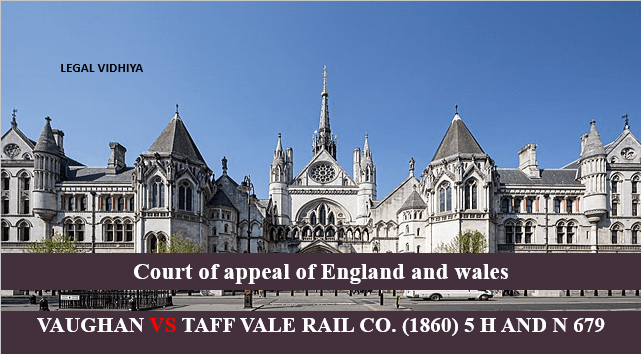
| Citation | (1860) 5 H and N 679 |
| Date of Judgment | 12th May, 1860 |
| Court | Exchequer |
| Jurisdiction | England and Wales |
| Application | Vaughan |
| Respondent | Taff vale rail co. |
| Bench | Bench of Exchequer court of England |
| Referred | Law Of Torts |
FACTS OF THE CASE
A wood adjacent to the defendant’s railway was burnt by sparks from the locomotives. It was set on fire on several previous occasions and the company compensated for the loss. Evidence was given that the defendant had made every effort to make engines safe, but it was acknowledged that despite these precautions the engines sometimes became a means of setting fire to wood. The bank of railways was covered with inflammable grass.
ISSUES
Whether the injury was caused by the first setting fire to the grass on the embankment or whether it was caused by a lighter substance thrown from the locomotive onto the plaintiff land.
ARGUMENTS
(1900–01), in Great Britain, successful trial of a suit brought by the Taff Vale Railway Company against the Amalgamated Society of Railway Servants (ASRS), in which the courts held that the union was sued for damages caused by the actions. Its officers in industrial disputes. Opposition to the decision greatly encouraged the growth of the fledgling British Labor Party.
Strike, mass refusal by employees to work under the conditions required by employers. Strikes occur for a variety of reasons, although primarily in response to economic conditions (defined as an economic strike and aimed at improving wages and benefits) or labor practices (aimed at improving working conditions). Other strikes may arise from sympathy for other striking unions or from jurisdictional disputes between two unions. Illegal strikes include sit-down strikes, wildcat strikes, and partial strikes (such as recessions or sick-ins). Strikes can also be called for purely political reasons (as in a general strike).
In most industrialized countries, the right to strike is, in principle, extended to private sector workers. However, some countries require that specific efforts be made toward resolution before calling a strike, while other countries prohibit political strikes or public employee strikes altogether. Originally the redress of wrongs was direct – an eye for an eye, a tooth for a tooth. With the introduction of monetary systems and dissatisfaction with the inequities of this retaliatory redress, disputes began to be settled by paying money compensation. Today this concept is present in almost every body of law. Although Roman law had a developed system of monetary compensation for wrongs and although this remedy appeared early in the development of English law and became the primary remedy of the common law courts, the development of the modern law of damages is a function of Anglo-American legal process. The jury plays a major role in this. Particularly in the United States, a body of legal theory has developed around such issues as how evidence may be presented to a jury, how a judge may instruct the jury on the law, and the jury’s responsibility for specific mistakes. What harm can it cause.
Damages are generally awarded under contract and tort law. When one party to a contract fails to perform his obligation, the other may demand compensation under three heads: (1) Compensation, which consists of whatever goods, services or money he has given to the breaching party, it is returned, 2) expectation, which gives him rewards as if the contract had been fully performed (this includes anticipated profits on the contract), and (3) reliance, which gives him expenses incurred or incurred “in reliance” on the contract. Provides compensation for liabilities. being performed. Damages arising from reliance are limited to those consequences which were reasonably foreseeable by the parties at the time of the contract. These measures can be applied in various combinations, until the aggrieved party is left in a better position than if the violation had not occurred.
JUDGEMENT
The jury found the company guilty of negligence. Firstly, assuming that the fire was caused by coal from the engines falling into the plaintiff’s wood, the defendants were liable.
He was not exempted from the Railway Clauses Consolidation Act.
If the fire broke out on the defendant’s land and reached the timber along the railway, there was evidence to justify the verdict, and the defendants were not protected.
It is no defense that the plaintiff had rendered his timber particularly liable to fire by neglecting to remove dry grass and dead wood.
REFERENCES
This Case Law is written by Bhaavya Mishra of Vikramajit Singh Sanatan Dharma College, Intern at Legal Vidhiya.




0 Comments